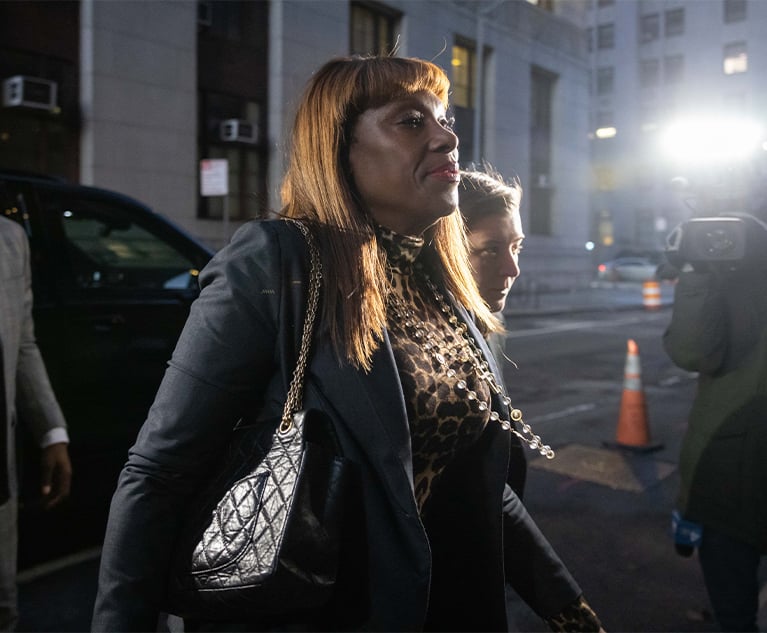NY Set to Open Window for Lawsuits by Child Sex Abuse Victims
The new bill was initially a two-way agreement between the State Senate and Assembly that was negotiated apart from the governor's office, but Cuomo confirmed his support for the legislation Thursday afternoon.
January 24, 2019 at 12:34 PM
6 minute read

A bill to raise the statute of limitations in cases of child sex abuse, called the Child Victims Act, is expected to pass both the state Senate and Assembly on Monday, sources familiar with the legislation said Thursday.
The legislation, which is set to be approved by Gov. Andrew Cuomo, would raise the age at which victims can bring both civil and criminal cases against their alleged abusers and would create a one-year period for individuals above that age to bring civil claims.
Assemblywoman Linda Rosenthal, D-Manhattan, sponsors the legislation in the Assembly, which has passed the bill in previous years. She said her colleagues are expected to, once again, approve the legislation next week. The vote is scheduled for Monday, sources said.
Cuomo confirmed the vote in a statement on the bill Thursday afternoon.
“For too long, society has failed these survivors of abuse and their traumas at the hands of authority figures have only been compounded by a justice system that denied them their day in court. In New York, this ends now,” Cuomo said. “Passing the Child Victims Act is a key part of my 100-day Agenda. I'm proud to say the time is now to pass this critical legislation to end this heinous injustice once and for all and give these victims their day in court.”
The bill, set to be introduced sometime this week, would raise the civil statute of limitations in cases of child sex abuse to age 55. That's higher than the legislation from last year, which would have allowed those claims to age 50. Rosenthal said they raised it after conversations with stakeholders and her colleagues in the Legislature.
“People made the case that was needed on the civil side,” Rosenthal said. “It's substantially similar to what the Assembly's passed twice already.”
State Sen. Brad Hoylman, D-Manhattan, is the sponsor of the bill in the Senate. He said the bill will have 38 cosponsors in the 63-member chamber when it's introduced—more than any other year. That makes it almost guaranteed to pass when brought up for a vote. He said he's interested to see if there will be any support for the bill from Republicans, who lost majority control of the chamber to Democrats in last year's election.
“I think from a political standpoint it will be interesting to see how many votes we get on legislation that had been blocked for more than a decade by Senate Republicans,” Hoylman said. “Will it be like the ban on conversion therapy where we got 14 votes by Republicans when the bill had been blocked for consideration for years? If that's the case, I think it shows you that the attempts to keep progressive legislation from going to the floor weren't in the best interest of New Yorkers.”
The statute of limitations for criminal cases of child sex abuse would also be raised by the bill. Criminal charges would be allowed until age 28 for felony offenses and age 25 for misdemeanor cases, according to Hoylman. The current statute of limitations for both criminal and civil cases is age 23.
The bill would also create a so-called look-back window for individuals above the age of 55 who want to bring civil claims against their alleged abuser. The legislation would leave a six-month gap between when the bill becomes law and the window starts to give victims time to get their affairs in order and prepare a case with an attorney.
New language in the bill will also clear up confusion about who could face litigation during the lookback window. After Cuomo included the legislation as part of his executive budget proposal last week, the Catholic Church claimed it was written in a way that public institutions, like schools, would be exempt from being sued during the window.
Hoylman disagreed with that interpretation of the bill last week, saying they did not want public entities to be exempt from litigation. The legislation will now include language that clearly says both public and private entities may face lawsuits during that time from victims, he said.
“We are making it abundantly clear that the notice of claims provision is waived for public institutions, meaning it allows individuals to file claims against public schools and other public venues where sexual abuse incident may have occurred,” Hoylman said.
The rest of the changes, according to Rosenthal and Hoylman, are technical and will not affect the major provisions of the legislation.
Hoylman also said he's open to the possibility of introducing new legislation this year after the bill becomes law that would extend the look-back window past the one-year period, though those discussions are ongoing.
“I view it as really, a very good starting point where more conversations in policy discussion about child sexual abuse, about those who've covered up these crimes and it will be revealing once the bill has been enacted into law to see whether we strengthen the legislation moving forward,” Hoylman said.
Gary Greenberg, a lead advocate for the bill and founder of the Fighting for Children PAC, said he was told by members of the Senate that the bill will be approved by lawmakers Monday. He said he's planning to hold a rally Monday in Albany before the bill is passed.
“Today we are one step closer to providing justice to thousands of child victims of rape with news the State Legislature will take up the Child Victims Act on Monday,” Greenberg said. “For many years I have worked to see this issue enacted into law and have worked to elect candidates in the State Senate to make the Child Victims Act a reality.”
The new bill was initially a two-way agreement between the State Senate and Assembly that was negotiated apart from the governor's office, but Cuomo confirmed his support for the legislation Thursday afternoon.
READ MORE:
This content has been archived. It is available through our partners, LexisNexis® and Bloomberg Law.
To view this content, please continue to their sites.
Not a Lexis Subscriber?
Subscribe Now
Not a Bloomberg Law Subscriber?
Subscribe Now
NOT FOR REPRINT
© 2024 ALM Global, LLC, All Rights Reserved. Request academic re-use from www.copyright.com. All other uses, submit a request to [email protected]. For more information visit Asset & Logo Licensing.
You Might Like
View All
Attorneys 'On the Move': Structured Finance Attorney Joins Hunton Andrews Kurth; Foley Adds IP Partner
4 minute read

NY Civil Liberties Legal Director Stepping Down After Lengthy Tenure

Former Top Aide to NYC Mayor Is Charged With Bribery Conspiracy
Trending Stories
- 1Call for Nominations: Elite Trial Lawyers 2025
- 2Senate Judiciary Dems Release Report on Supreme Court Ethics
- 3Senate Confirms Last 2 of Biden's California Judicial Nominees
- 4Morrison & Foerster Doles Out Year-End and Special Bonuses, Raises Base Compensation for Associates
- 5Tom Girardi to Surrender to Federal Authorities on Jan. 7
Who Got The Work
Michael G. Bongiorno, Andrew Scott Dulberg and Elizabeth E. Driscoll from Wilmer Cutler Pickering Hale and Dorr have stepped in to represent Symbotic Inc., an A.I.-enabled technology platform that focuses on increasing supply chain efficiency, and other defendants in a pending shareholder derivative lawsuit. The case, filed Oct. 2 in Massachusetts District Court by the Brown Law Firm on behalf of Stephen Austen, accuses certain officers and directors of misleading investors in regard to Symbotic's potential for margin growth by failing to disclose that the company was not equipped to timely deploy its systems or manage expenses through project delays. The case, assigned to U.S. District Judge Nathaniel M. Gorton, is 1:24-cv-12522, Austen v. Cohen et al.
Who Got The Work
Edmund Polubinski and Marie Killmond of Davis Polk & Wardwell have entered appearances for data platform software development company MongoDB and other defendants in a pending shareholder derivative lawsuit. The action, filed Oct. 7 in New York Southern District Court by the Brown Law Firm, accuses the company's directors and/or officers of falsely expressing confidence in the company’s restructuring of its sales incentive plan and downplaying the severity of decreases in its upfront commitments. The case is 1:24-cv-07594, Roy v. Ittycheria et al.
Who Got The Work
Amy O. Bruchs and Kurt F. Ellison of Michael Best & Friedrich have entered appearances for Epic Systems Corp. in a pending employment discrimination lawsuit. The suit was filed Sept. 7 in Wisconsin Western District Court by Levine Eisberner LLC and Siri & Glimstad on behalf of a project manager who claims that he was wrongfully terminated after applying for a religious exemption to the defendant's COVID-19 vaccine mandate. The case, assigned to U.S. Magistrate Judge Anita Marie Boor, is 3:24-cv-00630, Secker, Nathan v. Epic Systems Corporation.
Who Got The Work
David X. Sullivan, Thomas J. Finn and Gregory A. Hall from McCarter & English have entered appearances for Sunrun Installation Services in a pending civil rights lawsuit. The complaint was filed Sept. 4 in Connecticut District Court by attorney Robert M. Berke on behalf of former employee George Edward Steins, who was arrested and charged with employing an unregistered home improvement salesperson. The complaint alleges that had Sunrun informed the Connecticut Department of Consumer Protection that the plaintiff's employment had ended in 2017 and that he no longer held Sunrun's home improvement contractor license, he would not have been hit with charges, which were dismissed in May 2024. The case, assigned to U.S. District Judge Jeffrey A. Meyer, is 3:24-cv-01423, Steins v. Sunrun, Inc. et al.
Who Got The Work
Greenberg Traurig shareholder Joshua L. Raskin has entered an appearance for boohoo.com UK Ltd. in a pending patent infringement lawsuit. The suit, filed Sept. 3 in Texas Eastern District Court by Rozier Hardt McDonough on behalf of Alto Dynamics, asserts five patents related to an online shopping platform. The case, assigned to U.S. District Judge Rodney Gilstrap, is 2:24-cv-00719, Alto Dynamics, LLC v. boohoo.com UK Limited.
Featured Firms
Law Offices of Gary Martin Hays & Associates, P.C.
(470) 294-1674
Law Offices of Mark E. Salomone
(857) 444-6468
Smith & Hassler
(713) 739-1250






